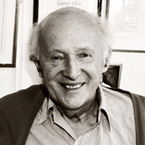
“There is a vast, astonishing river that is biology, and it follows its wonderful and awesome course … as scientists struggle to navigate between cliffs of exhilaration and depression, between wisdom and folly.”
George Klein, MD, PhD, professor emeritus of tumor biology at the Karolinska Institutet in Stockholm, died on December 10, 2016, at the age of 91. Klein was a Fellow of the AACR Academy and had been an AACR member since 1961.
Klein, who collaborated with his wife, Eva Klein, MD, PhD, FAACR, for most of his long and notable career, was at the forefront of advances in tumor biology and immunology. Among Klein ‘s many accomplishments was the discovery that neoplasms including Burkitt ‘s lymphoma and nasopharyngeal carcinoma have a common origin in the Epstein-Barr virus. Another landmark discovery was the role of chromosomal translocations in the activation of proto-oncogenes.
Klein was elected an honorary AACR member in 1988 and was inducted into the inaugural class of Fellows of the AACR Academy in 2013. He received the 1967 AACR G.H.A. Clowes Memorial Award and served on the Landon Basic Prize Selection Committee (2001-2002). He was featured four times on the cover of Cancer Research.
Born July 28, 1925, Klein spent most of his childhood in Budapest, Hungary. During the Holocaust, many of his relatives and friends were sent to Auschwitz under the guise of resettlement. He had read a report about the atrocities, and although he was slated to be sent to the concentration camp in 1944, he fled.
In 1947, Klein settled in Sweden, where he completed his medical degree and PhD. He received a personal professorship in tumor biology at the Karolinska Institutet, launching a lifetime of service to science. From his retirement in 1993 until his death, he was a research team leader at the Department of Microbiology, Tumour and Cell Biology, MTC, at Karolinska Institutet.
Klein was known outside of the scientific community as an author. He wrote several books on topics encompassing philosophy and science. His final book, titled Resistance, was published in 2015.
Klein received numerous honors throughout his career, including the 1979 Alfred P. Sloan, Jr., Prize of the General Motors Cancer Research Foundation for his pioneering work on the interrelation of cancer and the immune system. He was a member of the Royal Swedish Academy of Sciences, the Karolinska Institutet’s Nobel Assembly (1957-1993), and the U.S. National Academy of Sciences.
Career Highlights
2010 Royal Award of the Swedish Academy
2010 Distinguished Professor Award, Karolinska Institute
2008 Block Memorial Lectureship Award for Achievement in Cancer Research, The Ohio State University
2005 G. J. Mendel Honorary Medal for Merit in the Biological Sciences
1998 Anniversary Prize, Swedish Medical Association
1998 Lifetime Achievement Award, Institute of Human Virology
1988 Honorary Member, AACR
1979 Alfred P. Sloan Award, General Motors Cancer Research Foundation
1975 Elected Member, Royal Swedish Academy of Sciences
1973 Annual National Award, American Cancer Society
1973 Elected Foreign Associate, National Academy of Sciences, Washington, D.C.
1972 Fogarty Scholar, National Institutes of Health
1967 AACR-G.H.A. Clowes Memorial Award
1957-1993 Professor of Tumor Biology and Head of Department of Tumor Biology, Karolinska Institute
1951 MD, PhD, Karolinska Institute